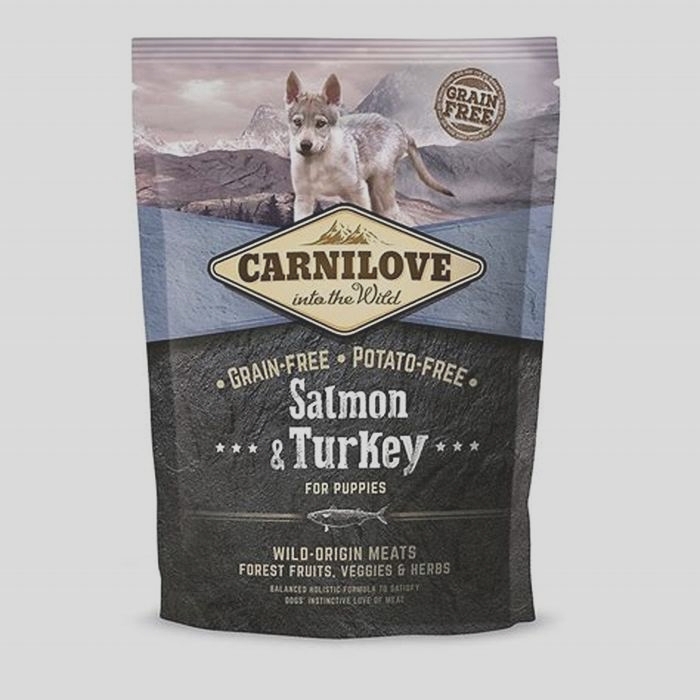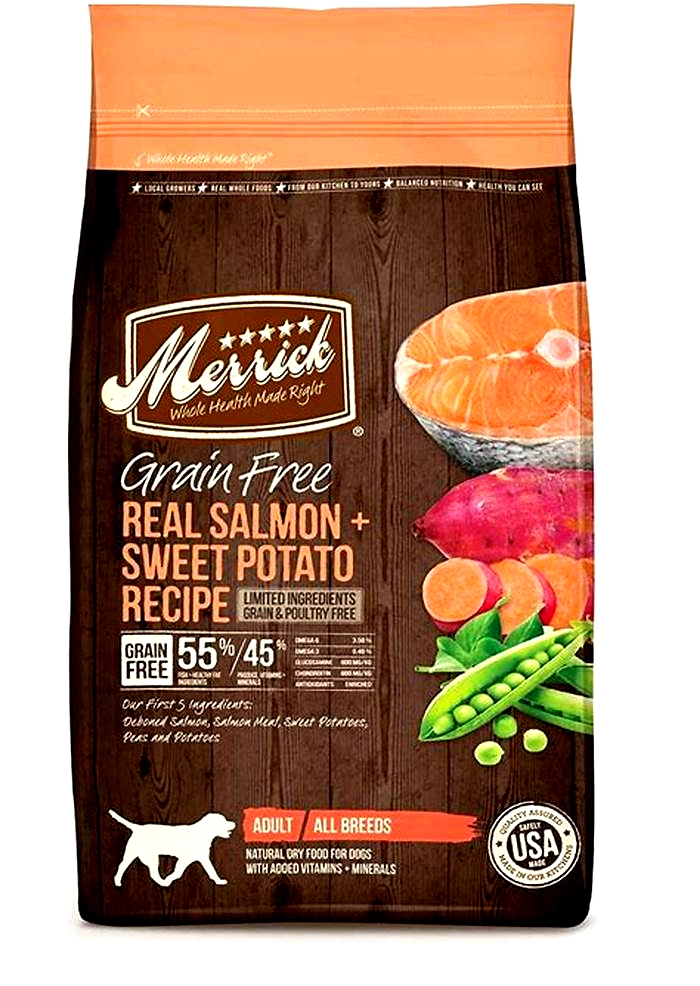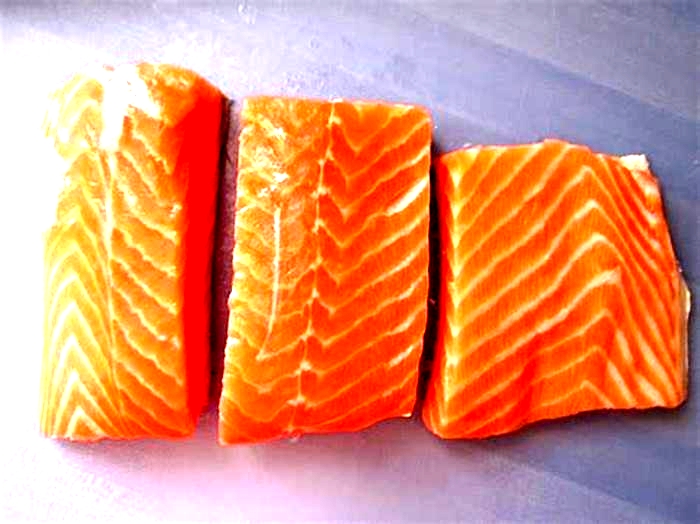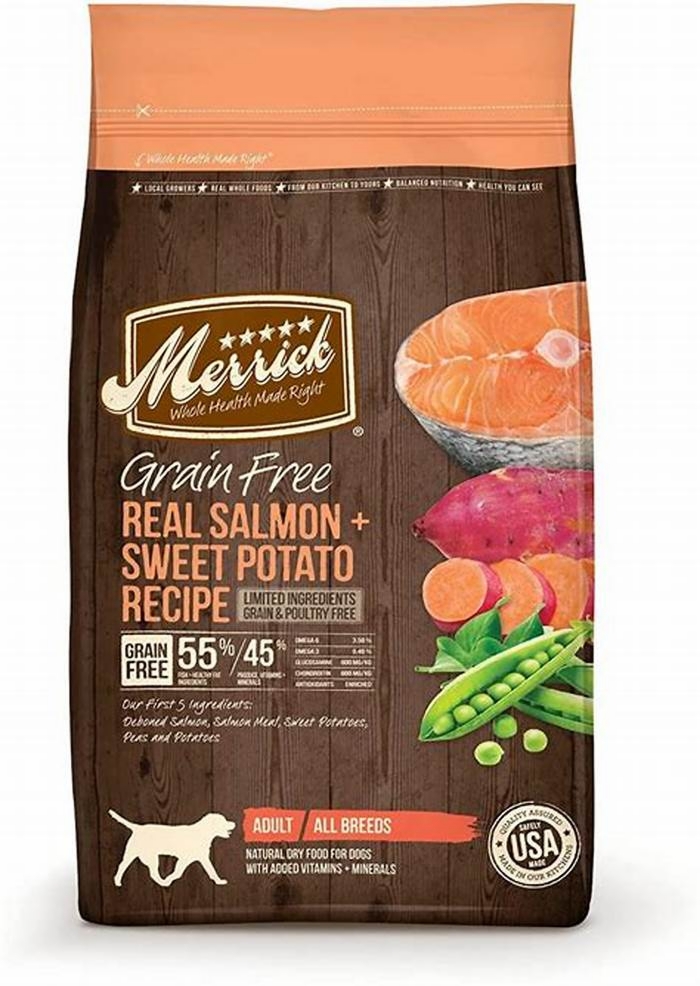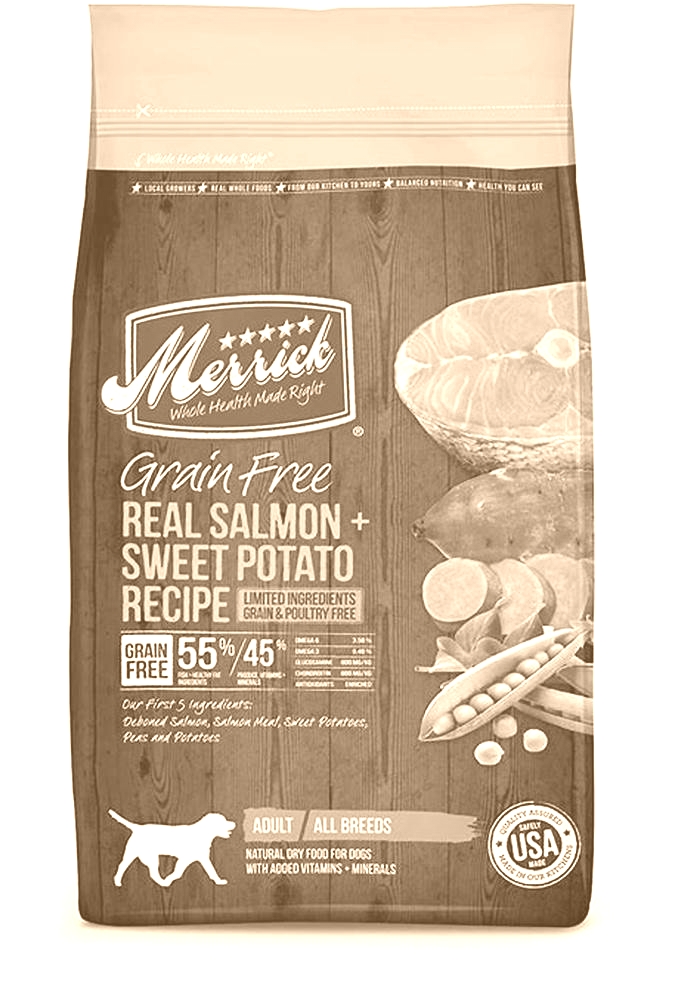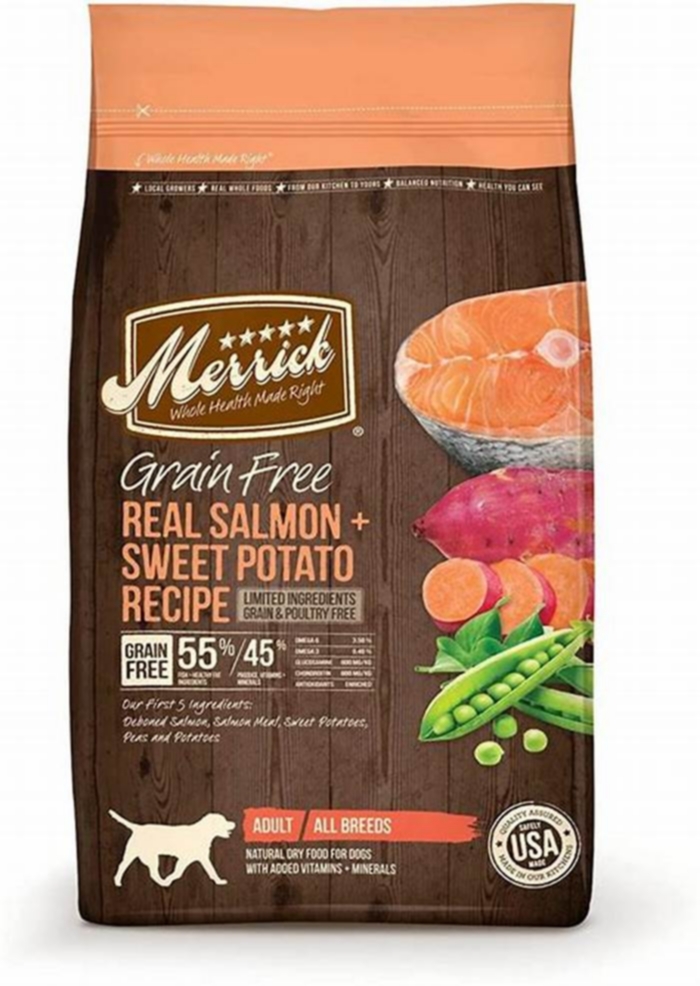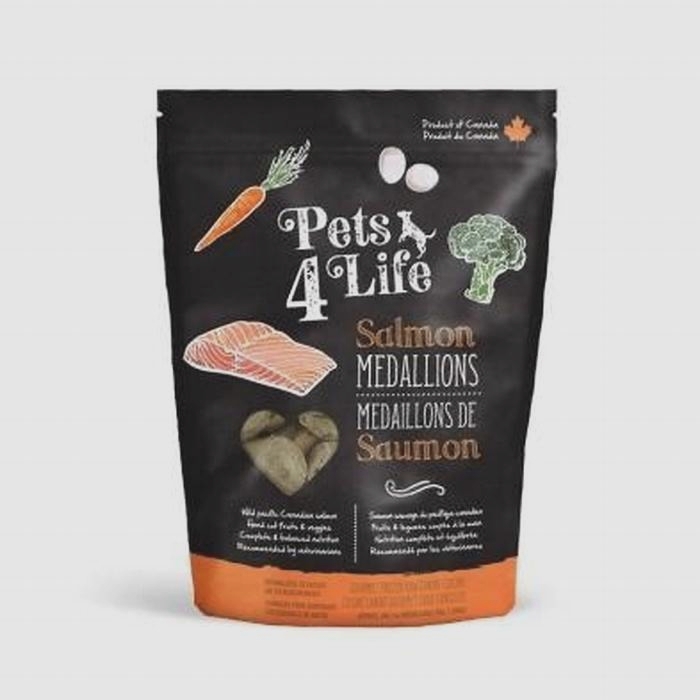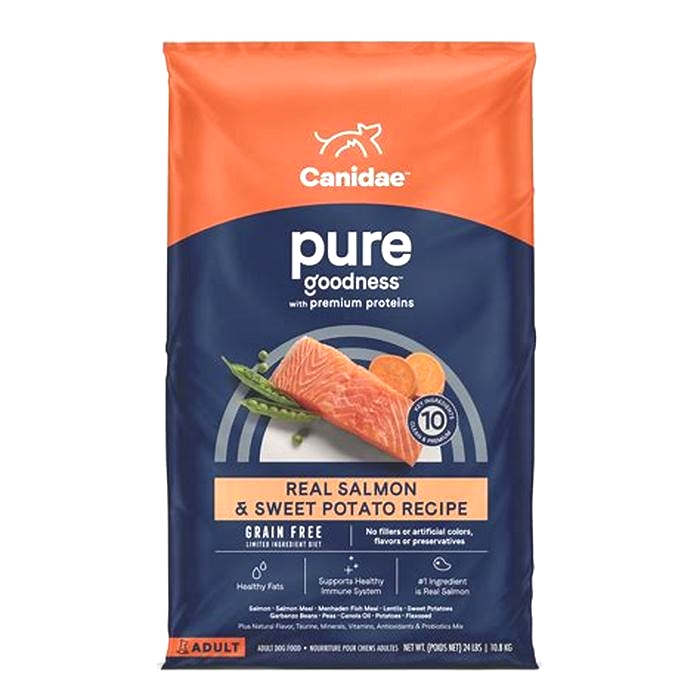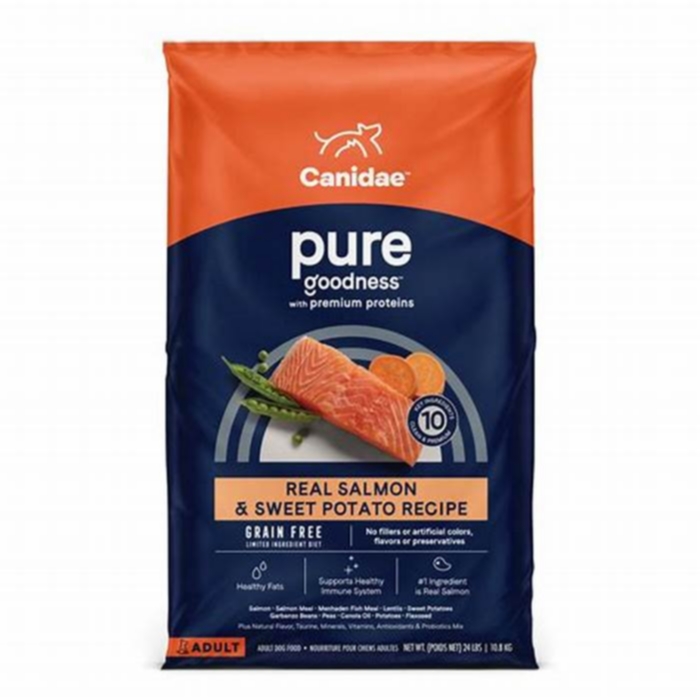turkey vs salmon dog food
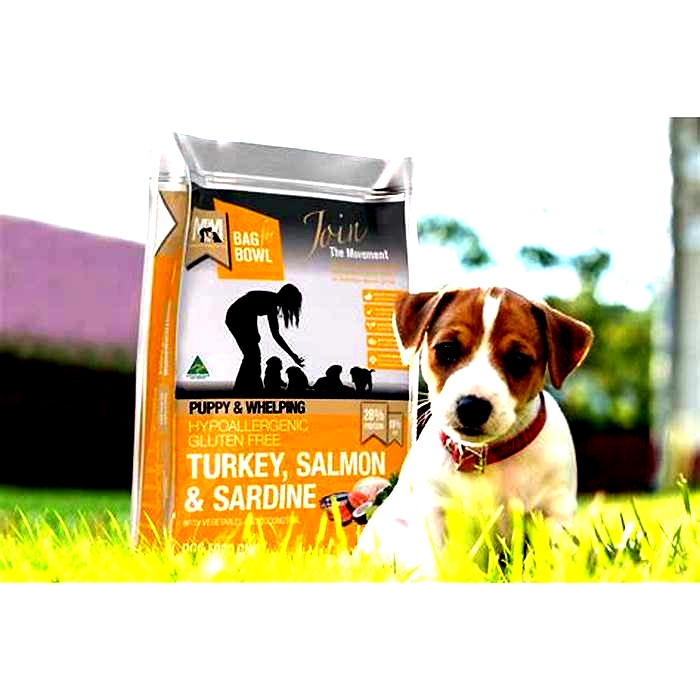
Alternative Proteins in Dog Food: Salmon, Duck, Turkey & More
The days of simply choosing between beef or chicken for dinner are long gone, even for your dog. With more alternative protein sources available than ever before not just turkey dog food, but salmon dog food and even duck dog food navigating your pup's meal selection can seem daunting. Read on for a concise breakdown of why, when and which alternative protein sources may make sense for your pet.
Protein Sources for Dogs: Why Go Alternative?
Protein is an essential nutrient for dogs. Its amino acids lay the foundation for muscles, tissue repair and a healthy coat and skin, among many other benefits. But why has there been an increased variety of protein sources lining stores' pet food shelves in recent years?
Contrary to popular belief, it's not prudent to rotate flavors for your dog's meals. Some pet parents are simply following a fad, but others are changing up what they feed their dog to accommodate a food allergy. Some dogs can develop a food sensitivity, even after having eaten an ingredient for years. This can involve a range of signs:
- Itching
- Licking or chewing irritated skin
- Skin infections and/or hot spots
- Paw pad infections
- Recurrent ear infections
- Vomiting
- Diarrhea
- Belching or flatulence
- Frequent bowel movements
While a true food allergy test takes up to 16 weeks of patiently following a dietary food trial, beef and chicken are two of the most commonly identified sources of food sensitivities in dogs. A recent trend toward grain-free diets for dogs would have you believe that grains pose a threat or are responsible for the majority of allergies in dogs, but this is rarely the case. When a dog has a food allergy, it's typically to an animal-based protein in their diet.
Another growing concern that can push pet parents to consider alternative protein sources is meat's environmental impact. Beef, for example, is resource-intensive: It requires a lot of land, water and animal feed to produce. Avoiding environmentally taxing protein sources, such as beef and lamb, and seeking out more sustainable ones can help reduce the burden on our planet's resources while still ensuring top-notch nutrition and health for your dog.
Types of Alternative Protein Sources in Dog Food
Examples of protein sources currently used in dog food include:
- Beef
- Brewer's yeast
- Casein
- Chicken
- Corn gluten meal
- Duck
- Eggs
- Fish meal
- Pea protein
- Pork
- Potato protein
- Rice protein
- Salmon
- Soybeans
- Tuna
- Turkey
- Wheat gluten
- Venison
- Whey
This list isn't comprehensive. Commercially available protein sources are continually being revised. It's also important to realize that while organ meats and byproducts may not be on your dinner plate, they are a normal part of your pet's diet. Utilizing all parts of an animal not only resembles how animals evolved to eat, it's also the most sustainable way of incorporating animal proteins in dog food.
Choosing Alternative Proteins
If you want to try an alternative source of protein in your dog's diet, it should be under the direct guidance of your veterinarian. Your vet can also help you select which protein to try, and transition to the new food gradually over 7 days. Here are some of the more common alternative protein sources vets recommend.
Turkey Dog Food
While not a newcomer to alternative proteins, turkey is an excellent base for dog foods. Turkey is lean and high in protein, and turkey is an uncommon food allergen in dogs. Poultry overall has a smaller carbon footprint than beef, making this a step toward eco-friendly dog food protein sources.
Salmon Dog Food
You may have heard about the health benefits of fish oil for humans, but did you know salmon's omega-3 fatty acids provide the same anti-inflammatory benefits to dogs? If your dog struggles with a dull coat or itchy skin, salmon dog food may be an easy answer. Salmon also usually has a lower environmental impact than beef.
Duck Dog Food
Somewhat more exotic and new to the dog food aisle, duck-meat-based kibble offers another source of protein. Duck is also higher in fatty acids than competing poultry-based diets and offers a different flavor profile for pooches who turn up their snout at salmon dog food or other alternative proteins.
The Bottom Line
We have seen an explosion in dog food trends that model human diet trends whether that's grain-free, raw, vegan, farm-to-table, plant-based or homemade. It's important, though, to recognize that what is best for people is not always best for our four-legged friends (and some of these trends can even pose health risks to dogs). Though many of these trends often do not provide any nutritional benefit and are geared more toward satisfying human desires than canine nutrition, there are sound reasons a dog owner may seek out alternative protein sources, including diagnosed allergies. Just remember to talk to your vet first.
Contributor Bio

Dr. Laci Schaible
Dr. Laci Schaible is a small-animal veterinarian and entrepreneur living in Sarasota, Florida.
Is Salmon Or Turkey Better For Dogs With Allergies
Is Salmon Or Turkey Better For Dogs With Allergies
When it comes to feeding dogs with allergies, choosing the right protein source is crucial. Two popular options for dogs with allergies are salmon and turkey. Both proteins offer unique benefits and can be a great addition to your dogs diet, but which one is better?
Salmon is often recommended for dogs with allergies because it is considered a novel protein. This means that most dogs have not been exposed to it before, making it less likely to cause an allergic reaction. Salmon is also rich in omega-3 fatty acids, which can help reduce inflammation and promote a healthy coat and skin.
Table Of Contents
On the other hand, turkey is a lean meat that is relatively low in fat. This makes it a great option for dogs with sensitive stomachs or weight management issues. Turkey is also rich in essential nutrients like protein, vitamins B6 and B12, and zinc, which can support your dogs overall health and well-being.
Ultimately, the best protein source for dogs with allergies will depend on your pets specific needs and individual tolerance. Its important to consult with your veterinarian to determine the best diet for your dog and to ensure that their nutritional needs are being met.
What are the causes of allergies in dogs?
Dogs can develop allergies as a response to various substances in their environment or diet. Some common causes of allergies in dogs include:
- Food allergies: Some dogs may develop allergies to certain ingredients in their food, such as proteins, grains, or additives.
- Environmental allergies: Dogs can be allergic to substances in the environment, such as pollen, dust mites, mold, or certain types of grass.
- Insect allergies: Some dogs may have allergic reactions to insect bites or stings, such as those from fleas, ticks, or mosquitoes.
- Contact allergies: Dogs can develop allergies to certain materials or substances that come into direct contact with their skin, such as certain fabrics, cleaning products, or grooming products.
- Seasonal allergies: Similar to humans, dogs can also experience seasonal allergies, which are usually triggered by changes in pollen and other environmental allergens during specific times of the year.
Allergies in dogs can cause various symptoms, including itching, redness, inflammation, rashes, sneezing, coughing, watery eyes, gastrointestinal upset, and even respiratory distress. Its essential to identify and address the underlying cause of the allergy to provide relief and prevent further discomfort for the dog.
Common causes of allergies in dogs:
| Type of Allergy | Main Causes || Food allergies | Proteins, grains, additives || Environmental allergies | Pollen, dust mites, mold, grass || Insect allergies | Flea bites, tick bites, mosquito bites || Contact allergies | Fabrics, cleaning products, grooming products || Seasonal allergies | Pollen and other environmental allergens |
If you suspect that your dog has allergies, it is important to consult with a veterinarian for proper diagnosis and treatment. They can conduct tests, such as skin or blood tests, to determine the specific allergen causing the reaction and provide appropriate recommendations, which may include dietary changes, medication, or environmental modifications.
The benefits of salmon for dogs with allergies
Dogs with allergies can benefit greatly from incorporating salmon into their diet. This fish is not only a great source of protein but also rich in essential omega-3 fatty acids, which have numerous health benefits for dogs. Here are some of the key benefits of salmon for dogs with allergies:
- Reduced inflammation: Omega-3 fatty acids found in salmon can help reduce inflammation in dogs with allergies, relieving symptoms such as itching and redness.
- Improved skin and coat health: Salmon is rich in omega-3 fatty acids, which can help nourish dogs skin and promote a healthy, shiny coat. This is especially beneficial for dogs with dry or itchy skin caused by allergies.
- Stronger immune system: Salmon contains antioxidants and other nutrients that can help boost dogs immune system, making them less susceptible to allergens and other health issues.
- Enhanced joint health: Omega-3 fatty acids found in salmon have anti-inflammatory properties that can help alleviate joint pain and stiffness in dogs with allergies, improving their overall mobility and comfort.
- Supports brain development: The omega-3 fatty acids DHA and EPA, present in salmon, are essential for healthy brain development in puppies and can also support cognitive function and brain health in adult dogs.
When incorporating salmon into a dogs diet, it is important to ensure that it is cooked thoroughly to kill any potential parasites or bacteria. It is also recommended to consult with a veterinarian to determine the appropriate amount of salmon to feed your dog, taking into consideration their size, age, and any specific dietary needs or restrictions they may have.
The benefits of turkey for dogs with allergies
If your dog has allergies, feeding them a diet that is free from potential allergens is crucial to their health and well-being. One protein source that is often recommended for dogs with allergies is turkey. Turkey is a lean meat that is rich in essential nutrients and can provide various benefits for dogs with allergies.
1. Hypoallergenic: Turkey is considered a hypoallergenic protein source, meaning it is less likely to cause allergic reactions in dogs compared to other meats. This makes it an excellent option for dogs with known food allergies or sensitivities.
2. High in protein: Turkey is a great source of high-quality protein, which is necessary for the growth and repair of tissues in dogs. Providing your dog with an adequate amount of protein is essential, especially for those with allergies, as it helps support their immune system and overall health.
3. Low in fat: Turkey is a lean meat, meaning it contains less fat compared to other protein sources. Dogs with allergies can benefit from a low-fat diet as it can help prevent weight gain and potential digestive issues that may worsen their allergies.
4. Nutrient-rich: Turkey is packed with essential nutrients such as vitamins B6 and B12, niacin, zinc, and selenium. These nutrients play a vital role in supporting your dogs overall health and immune system, helping them better manage their allergies.
Read Also: Can Amlodipine be Fatal for Dogs? A Guide for Pet Owners
5. Versatile: Turkey can be prepared in various ways, making it a versatile protein source for dogs with allergies. You can feed your dog cooked turkey as part of their regular meals or incorporate it into homemade treats to add variety to their diet.
Incorporating turkey into your dogs diet can provide several benefits for dogs with allergies. However, its essential to introduce any new food gradually and monitor your dog for any adverse reactions. If you have concerns about your dogs allergies or diet, consult with a veterinarian for personalized advice.
Read Also: Grouse Hunting Without A Dog - Tips and Tricks for Solo Hunters
Which is better for dogs with allergies: salmon or turkey?
If your dog has allergies, its important to find the right food that wont trigger any adverse reactions. Two popular options for dogs with allergies are salmon and turkey. Lets take a closer look at both to determine which one is better.
Salmon
Salmon is known for its high omega-3 fatty acids content, which can help reduce inflammation caused by allergies. It is also a great source of protein, which is essential for dogs with allergies. However, some dogs may be allergic to salmon itself, so its crucial to introduce it slowly into their diet to monitor any negative reactions.
- Pros of salmon:
- High in omega-3 fatty acids
- Good source of protein
- Cons of salmon:
- Potential for allergic reactions
Turkey
Turkey is a lean protein source that is commonly recommended for dogs with allergies. It is a hypoallergenic meat that is less likely to cause adverse reactions in dogs with food sensitivities or allergies. Additionally, turkey is rich in vitamins, minerals, and amino acids, making it a nutritious choice for dogs.
- Pros of turkey:
- Hypoallergenic meat
- Rich in vitamins, minerals, and amino acids
- Cons of turkey:
- May not be as high in omega-3 fatty acids as salmon
Conclusion
Both salmon and turkey can be suitable options for dogs with allergies, but it ultimately depends on the individual dogs allergies and preferences. If your dog is not allergic to salmon, it can provide excellent nutritional benefits. However, if your dog has a known allergy to salmon, turkey can be a safe and nutritious alternative. Consulting with your veterinarian is always advised to determine the best diet for your dogs specific needs.
FAQ:
Is salmon a good option for dogs with allergies?
Yes, salmon can be a good option for dogs with allergies. It is a highly nutritious protein source that is hypoallergenic and easily digestible for most dogs.
What are some common symptoms of food allergies in dogs?
Common symptoms of food allergies in dogs include itching, red or inflamed skin, ear infections, gastrointestinal upset (such as diarrhea or vomiting), and chronic ear infections.
Is turkey a good option for dogs with allergies?
Turkey can be a good option for dogs with allergies, as it is a lean protein source and is less likely to cause allergic reactions compared to common allergens like chicken or beef.
How do I know if my dog has a food allergy?
If your dog is experiencing symptoms such as itching, red or inflamed skin, ear infections, gastrointestinal upset, or chronic ear infections, it may be a sign of a food allergy. Consult with your veterinarian to determine the cause of these symptoms.
What are some other alternative protein options for dogs with allergies?
Other alternative protein options for dogs with allergies include duck, venison, lamb, and fish. These proteins are less commonly found in commercial dog foods and are less likely to cause allergic reactions.
Should I switch my dogs diet if I suspect a food allergy?
If you suspect that your dog has a food allergy, it is recommended to consult with your veterinarian before making any dietary changes. They can provide guidance on an elimination diet or recommend specialized hypoallergenic dog foods.

